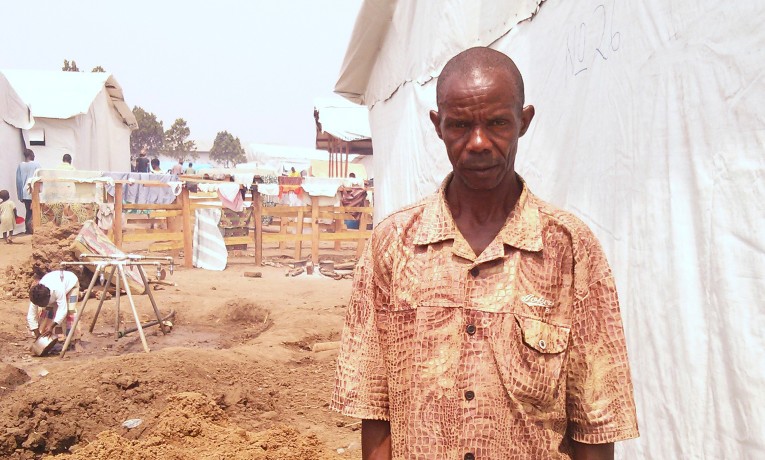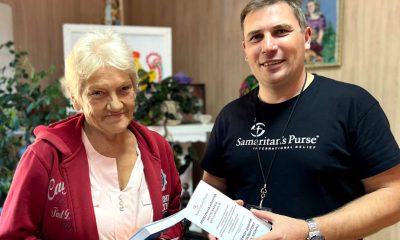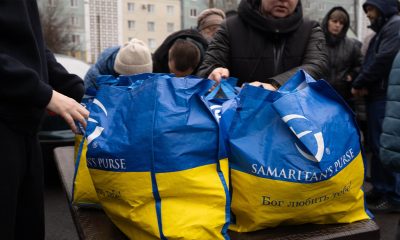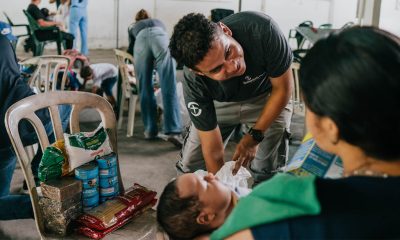Refugees poured into Uganda after violence erupted in the Democratic Republic of Congo. Two Samaritan’s Purse interns who spent time at the transit center where thousands of refugees are currently located wrote about their experiences.
By Sandy Kim and Kaitlyn McDonald, two interns who worked in the transit center where Samaritan’s Purse is helping DRC refugees
July 26
Sandy Kim
It is the end of our first day at the refugee camp. Since our arrival, we have learned more about the Congolese refugee crisis at Bundibugyo in western Uganda and witnessed firsthand how the work of Samaritan’s Purse team members, refugee camp workers, volunteers, supporters, and partner organizations is affecting people spiritually, emotionally, and physically.
Janet Karungi is a resident of Uganda with a strong familial identity rooted in Congo. She is now living in the Bundibugyo district with her two children. Years ago, Janet’s parents fled Congo to build a safe life for their children in Uganda. Today, Janet has come to the transit center to find work to support her Congolese relatives who she knows are residing in the camp.
Because she speaks the local language, she assisted us in translation. Janet and I began our assignment by sharing our hope to work from the heart of Jesus Christ. We moved around the camp witnessing people’s lives and listening to stories.
We met Masitura Baringwa, a grandmother and mother of nine children, who lost her husband in the escape from the rebels. She has a strong family around her, but it is difficult as she recollects the terrors of their flight and ponders the steps she must take to return to a place they can all call home. Congo is her home, and she hopes to return to the peaceful life that she remembers.
We also met Alima Kabira, a wife and mother of four children, who has lost everything in her home village when the rebels attacked. Underneath her quiet and restrained exterior, she was in deep dismay. Her biggest concern was the security and well-being of her family.
She strongly desires for a permanent end to the turmoil consuming her family. Through prayer and conversation, we hoped for Christ’s love to reach her heart and to remain there as she paves a long and hopeful road for her family. Alima hopes to find a settlement where they can build a secure life.
Today, 253 refugees registered in Bundibugyo, bringing the total to 16,948, with more numbers still being compiled. We are providing aid and relief to the hurting and apprehending the needs of these families. As I serve, I’ve become more mindful to the fact that we’re part of a situation that is perhaps one of the most challenging and vulnerable moments of these people’s lives.
July 27
Kaitlyn McDonald

Samaritan’s Purse plans to build 125 latrines in the transit camp in Uganda.
Within the first two hours of my arrival at the refugee transit center in Bundibugyo, I was impressed by the coordination I saw among the government and non-governmental organization workers. As I sat in on a meeting at the end of the day, I listened as people reported the accomplishments for the day, as well as the remaining gaps. Although each person in attendance wore the badge of their respective organization and had their separate tasks, there was no separation in their overall goal: working together to ensure that the basic needs of the refugees are met.
Today, I had the opportunity to witness one contribution that Samaritan’s Purse is making to the refugee transit center. During the early morning hours, I followed Edison, who is in charge of water, sanitation and hygiene, as he made a circuit along the eastern edge of the center. We set off at a quick pace, and the focused expression on Edison’s face told me that there were many things to accomplish before the day ended.
Our first stop was the water container site. Edison gathered the workers and outlined the work plan for the day—to install two 10,000-liter water tanks. These tanks will be the main source of water for hundreds of refugees staying along the eastern edge of camp. When the workers had the tools they needed to create the foundation for the tanks, we moved on to a nearby construction site.

These drums will allow the latrines to be emptied when they are full rather than building new ones.
As I looked around, I could see workers in this area already digging deep trenches. Edison explained that they were preparing the base for 16 bathing stalls and 16 latrines. I was relieved to hear that there would be more latrines soon—the line for the latrines has been growing, and many are becoming too full to use. Drums will be installed into the bottom of these new ones, which will allow them to be emptied and reused instead of constructing even more whenever the old ones become full.
Our third stop for the morning was at the southeastern corner of camp. Here, Samaritan’s Purse was digging trenches to create a drainage system. This will prevent rain from flooding the camp, which is crucial as the wet season is fast approaching. It will also prevent water from flooding the surrounding area, which is mostly used by local farmers.
Although a lot of time and effort were given to the activities I saw this morning, they are only a small piece of the contributions that Samaritan’s Purse and other organizations are making at the refugee transit center. Each day, as refugees continue to flow in and new issues arise, the task at hand can seem overwhelming. But with the coordinated effort of all groups involved, we are able to meet each challenge one step at a time.
I believe that this example of cooperation is a glimpse of the vision that God has for the Church. In 1 Corinthians 12, Paul reminds us that we are all a part of the Body of Christ, and we each have an important contribution to make.
Whether it is building latrines or providing first aid, all of these tasks are important for the refugees. Whether we are responding to the need of our neighbor next door or around the world, God asks us to contribute our gifts. When our efforts are combined and coordinated by God, the accomplishments will be great.
Sandy Kim
I noticed something today about the logo that we bear on our trucks and chests. It encourages the people we come into contact with. In the Bundibugyo transit center, things are constantly changing. People residing in the camp are under great stress and uncertainty. However, when people see the cross on our Samaritan’s Purse gear, they are reminded to seek and find comfort beyond their immediate situations. In the camp, people are looking for Samaritan’s Purse, and they want to assist us in our work.

Despite the difficulties she is facing, Asiinta is relying on God.
“God has washed away my tears,” said Babungi, a man at the camp. “I am also very happy to see children—my niece—working together with SP.”
Our emergency interventions at Bundibugyo address the physical needs of the situation; however, our encounters extend beyond physical work. When we approach people, I have noticed that they start to seek transformation, strength, guidance, and hope.
“God was the only one that has brought us here to safety,” said Asiinata, a woman at the camp who is in her 60s. “I am believing in God because God provides everything. I am lacking strength because of my age, but I am very well here as I can sleep, eat, and have water as much as I need. Wherever He leads me I will go. I want to ask God to guide me with wisdom and strength to cater for my two grandchildren and for the community who are listening to pray for our friends and neighbors who are going through similar situations.”
July 29
Kaitlyn McDonald
As I entered the refugee transit center this morning with my interpreter, Harriet, I could see that yesterday’s rain had taken its toll on the area. Roads and walkways were so muddy that each step had to be taken with care, lest you get stuck or slip. The incline of the center allowed water to roll down into many tents, dampening mattresses and creating mucky floors. A few latrines and other structures even collapsed due to the rain.
As I looked around for people to talk to, I was sure that the problems created by yesterday’s rain would be the topic on everyone’s lips today.But I was wrong.
Almost every individual I encountered assured me that they were happy. They felt safe, and their basic needs were being met. The rain caused discomfort, and a bad cough is spreading throughout the camp, but overall, they are content. I was astonished by their optimism, and it humbled me as I realized how I am often focused on my own comfort rather than being thankful for the blessings in my life.
As I met different individuals throughout the day, I noticed another recurring pattern in all of my encounters—small crowds slowly gathered around us as we talked. Some simply observed us while others expressed their hopes that we can change their circumstances.
My initial urge was to tell people that I am not a special or powerful person, and I cannot help them. But am I just telling myself this as an excuse to avoid involvement in their situation? Surely there is something I can do, even if it isn’t what they expect.
After a few moments of thinking about how I could respond, I realized that I am not entirely powerless. I could speak to other non-governmental organization workers and authority figures about the problems being brought to my attention. I could also share the stories of the refugees I encounter with other people—family, friends, Samaritan’s Purse, and readers like you. Perhaps these stories will move someone to do something that I cannot.
In moments when I don’t know what else to do, I simply pray. In fact, before Harriet and I left each crowd, we prayed together as a group. We thanked God for the safety and provisions of the transit center, and we thanked Him for His love and the community we have here. And then we asked God for His peace, healing, and guidance as we lay down our burdens before Him. He is our constant provider and comforter.
July 31
Kaitlyn McDonald

Tabita needs prayers for her grieving heart after losing her nephew and her sister in a short amount of time.
Tabita’s voice was soft as she shared her grief with us. She began by telling us about the day the rebels arrived near her home in Kamango.
“They arrested my nephew and killed him because he was a leader in our community,” she said.
When news of his death reached her and her family, they knew they had no other choice but to leave their home and seek refuge in Uganda.
For the past two weeks, Tabita and her family have been at the transit center. Although they are safe from the rebels here, they still face challenges. The center is designed for a maximum of 15,000 people, but more than 17,000 refugees have fled to this center as their last resort.
Samaritan’s Purse is working with other non-governmental organizations and the Ugandan government to meet the basic needs of the people staying here, but as long as the area remains overcrowded, many people will continue to struggle with life at the center.
“The situation here is not good,” Tabita said. “I have felt sick for many days now, but the only medications I’ve been given are painkillers.”
The rain also creates many problems. Whenever it rains, feces spread around the vicinity, increasing the incidence of diarrhea and other diseases. Water easily enters shelters and transforms the firm dirt floor into mud. The mat that Tabita sleeps on becomes soaked each time.
But Tabita’s greatest burden is the grief that she carries for the loss of her loved ones. In addition to her nephew, she now also grieves her sister who died yesterday while giving birth in a health center at a nearby refugee camp.
My heart was so heavy for Tabita, and I did not know what to say to her. As we prayed together, tears rolled down her cheeks. My prayer for her is that God will hold her close to Him during this time of grief. I pray that over time, Tabita’s sorrow will turn to joy, and she will be able to smile again.
Please keep Tabita and her family, as well as the needs of all the refugees, in your prayers.








